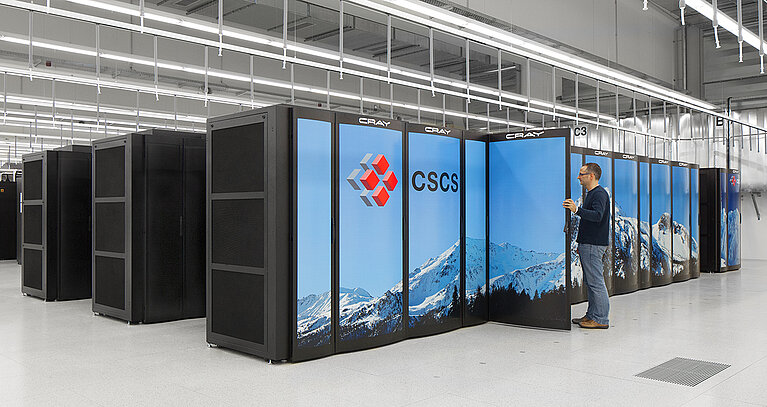September 05, 2016 - by CSCS
Researchers led by Peter Vincent from Imperial College London have made this year’s list of finalists for the Gordon Bell prize, with the backing of ‘Piz Daint’ at the Swiss National Supercomputing Centre. The prize is awarded annually in November at SC, the world’s largest conference on supercomputing. It honours the success of scientists who are able to achieve very high efficiencies for their research codes running on the fastest supercomputer architectures currently available.
Simulating fluid dynamic processes is still a challenge in engineering science. The research team from Imperial College developed new software that uses graphics processing units (GPUs) to better handle complex simulations of turbulence that are performed on large computer systems. Fluid dynamic simulations are essential, for example in aircraft construction, as the researchers emphasise in the abstract for the list of Gordon Bell finalists: “Accurate simulation of unsteady turbulent flow is critical for improved design of ‘greener’ aircraft that are quieter and more fuel-efficient.”
‘Piz Daint’, a Cray XC30 capable of 7.8 petaflops, isn’t the very fastest system worldwide, yet the hybrid system’s graphics processors (GPUs) lend themselves well to code optimisation. Vincent and his colleagues made use of this prior to testing their efficiency boost on the mighty 27 petaflop supercomputer ‘Titan’ (a Cray XK7) at the Oak Ridge Leadership Computing Facility (ORLCF). With the PyFR software for simulating fluid dynamic processes, which is based on the Python programming language, the researchers attained 13.7 quadrillion compute operations per second – and with that, simulations more precise than ever before.
Gordon Bell Prize
The ‘Gordon Bell Prize’ has been endowed by the Association for Computing Machinery since 1987 and is named after the famous computing engineer and pioneer in the field of high-performance computing. It has been presented at the SC conference in the United States every year since 1987. The prize is worth USD 10,000 and recognises outstanding achievements in supercomputing. It is intended to promote and drive forward the development of large-scale parallel computing, in which multiple computing operations run simultaneously in parallel.
